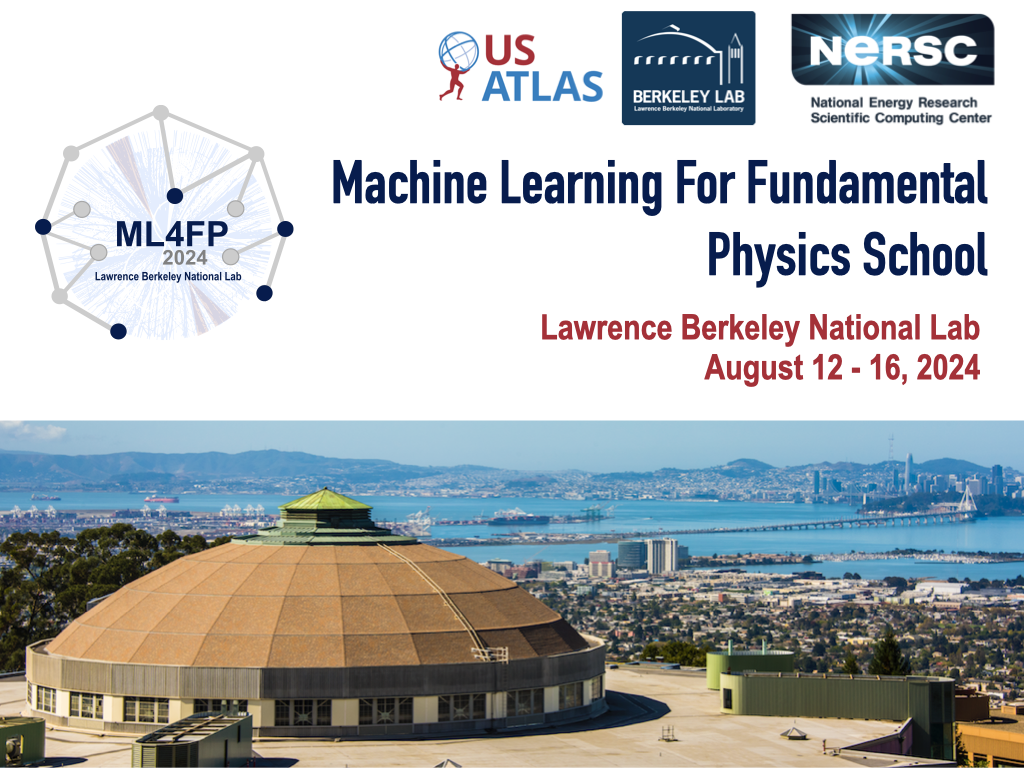The Machine Learning for Fundamental Physics (ML4FP) School will be hosted at Lawrence Berkeley National Laboratory. All talks and tutorials will be given in person, and participants can register to participate in-person or virtually. Following two very successful US ATLAS Machine Learning (ML) training events in 2022 and 2023, this year the program is open to all of particle physics. NERSC will provide training accounts with GPU nodes for registered participants. Thanks to the financial assistance provided by US ATLAS through the ATC program, US ATLAS students will be eligible for financial assistance with housing during their stay. There will also be a dedicated parallel session for ATLAS specific ML skills.
There is no registration fees for this school. The total number of registrations for each participation mode will be capped, so please register as soon as possible!
Getting to the School
From the Guest House
Participants staying at the Guest House can walk directly from the Guest House to the School venue: B66. The walk takes around 15 minutes and is described in this map.
From Berkeley:
Participants staying in Berkeley are advised to take the Blue LBL shuttle line up the hill until the B62/66 shuttle stop.
Overview:
We will introduce fundamental concepts of machine learning accompanied by hands-on tutorials of the essential open-source ML packages. The program will cover particle physics specific use cases and deployment of the trained models in C++ software (eg. Athena) / FPGAs, with lots of hands-on examples. There will be invited talks from veteran ML experts in HEP who have previously deployed ML for different tasks in experiments.
Attendees can expect to gain an overview of the range of current and upcoming ML applications in HEP, and also learn some of the particle physics specific tricks that an ML practitioner picks up from experience. We will try to address the typical ML questions that often come up in analysis meetings.
Tentative topics to be covered (many will include a hands-on component):
- Introduction to Machine Learning
- Introduction to standard open-source ML packages like Scikit-learn, XGBoost, Keras and Pytorch
- Overview of ML in particle physics
- Practitioners guide to handling particle physics datasets
- Generative Models
- Neural Simulation-Based Inference
- Uncertainty treatment
- Unfolding
- Exploiting symmetries in physics data
- Graph Neural Networks in particle physics
- Transformers and LLMs
- Differentiable Programming
- Deploying NNs in C++ and python: ONNX Runtime
- Deploying NNs on FPGA: Quantization, Model prunnning and compression, HLS4ML
The full agenda will be made public closer to the event.
Industry Talk:
In previous years we had speakers from Nvidia (Jaideep Pathak) and Amazon (Chen Luo) talk about their transition to industry and their research work in these companies. We will invite another exciting speaker this year from industry.
Computing Resources:
In-person participants will be guaranteed computing resources for the hands-on sessions thanks to NERSC. Virtual participants will be giving access on a first come first serve basis.
Networking:
The inaugural program led to new collaborative projects in ATLAS. This training program will again be a platform for young ML enthusiasts to connect with one another and with veteran ML experts in HEP.
Tutorial git:
Github link: https://github.com/ml4fp/2024-lbnl
Zoom: See Day 5 session links
Discussions:
Join the slack workspace to discuss and ask questions about the tutorials, particularly for remote participants.
Slack joining link: https://join.slack.com/t/ml4fp/shared_invite/zt-2nhv0qhts-pkH3Qf30YomavTOn3MP_nw
Organizing team:
Aishik Ghosh, he/him/they/them (UCI & LBL)
Elham E Khoda (SDSC/UCSD)
Benjamin Nachman (LBL)
Steven Farrell (NERSC/LBL)
Sascha Diefenbacher (LBL)
Oz Amram (Fermilab)
Maris Arthurs (SLAC)
Daniel Whiteson (UCI)
Shih-Chieh Hsu (UW)

